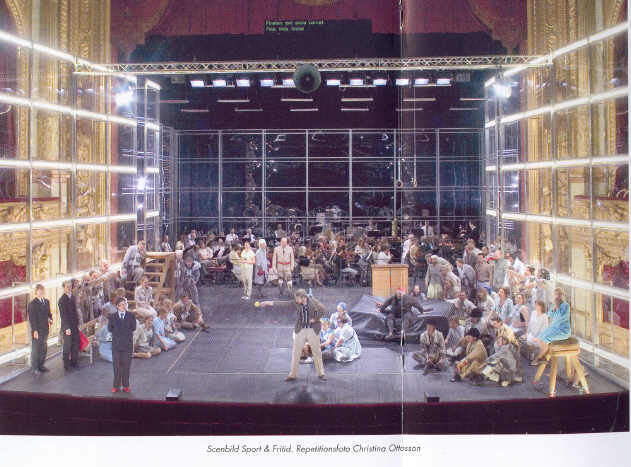

 |
 |
|
|
Stockholm Royal Opera 21 & 24 February 2005 Sport & Fritid 21 February 2005 Regi ÅSA MELLDAHL KUNGLIGA HOVKAPELLET & OPERANS KOR/JAN SODERBLOM
Music theatre at its best, Sport & Fritid is a debating ground about ideas and ideals, moral conundrums and politico-social issues. In her office, Laura gets hit on the head by a football and knocked out.... Beneath some superficial jollity lurks a deadly serious critique of destructive social values and codes of conduct, inherent in obsessive competitive sport, values that promote winning at all costs - costs to self and at the expense of one another and of 'the other' who must be put down to inflate self esteem. Jennefelt and Rådström toss the ball to the audience; Sport & Fritid brought to mind the ingenuities of Jonathan Dove's Flight, and it has a worthy, ground breaking production in Stockholm on a set by Bengt Gomer which placed the orchestra behind an extended stage, raised up to dress circle level for the penultimate scene in which 'we' joined the 'losers' banished to an underground changing room. The orchestra, dressed as an ordinary unspecified workforce, exemplified social cooperation for a common aim, caricatured on stage by the Fiendish Referee (Lena Nordin) who tries to keep control with rules and boundaries, applying Catch 22 - to join in you have to first learn the rules, which is impossible unless you already know them... Sport & Fritid Illustration: A general impression of the total transformation of Stockholm's gorgeous, traditional opera house is provided by the rehearsal photo of the last scene, taken from the lavishly illustrated programme. taken from the lavishly illustrated programme.
It was particularly frustrating being unable to follow the extensive essays and dialogues. Despite striking visual clues a-plenty to the thrust of the argument, language was a severe impediment for us, precluding a full review. The singers, dancers and gymnasts were excellent throughout, as was the choreography and movement co-ordination of the large cast. Unquestionably, Åsa Melldah 's astonishing and costly production of Sport & Fritid at the Swedish Royal Opera is deserving of a wider audience. We trust this has been recognised and that the opportunity was not lost to film it for a future DVD with the usual multi-lingual subtitles? A worthwhile project for a forward-looking sponsor. Don Carlos, seen a few days after the new Individuals at all levels become cogs in a power mechanism and tend to get crushed. Those adversely affected had few avenues towards redress except for rebellions and revolutions, which indeed haunted Europe for most of the 19 C. Appeals to decency and clemency had little effect. The spectre of fundamentalism has not vanished. The first, beautifully lit image of a frozen desolate wasteland sets the scene, Carlos's loving Elisabeth de Valois acting to create the warmth of a real fire with a few dead kindlings is doomed in this environment. This production sends out a warning to us all. Beware of the abuse of power, supposedly validated here as elsewhere in today's world by a divine and unassailable agency from beyond human spheres The tableau of a monk inquisitor in front of Holy Mary, who is standing on a pile of skulls, and is guarded by a circle of spears with the figure of Death rising behind her, was quite breathtakingly shocking. Verdi's well loved canonic masterpiece is played regularly in the world's great opera houses. The Kungliga Operan Stockholm has nothing to fear from comparison. The Swedish Royal Opera's production under the inspired direction of Friedrich Meyer-Oertel holds out a scary picture of powers-that-be exercising an iron grip on the drama's protagonists. The five-act version is given with only one interval (between Acts 3 & 4) and the pacing and smooth scene changes means that there are no longeurs. Sets are often hinted with minimal props, and subtle lighting creates atmosphere. Morandi maintains tension and orchestral detail tells repeatedly; the opera combines underlying horror, with many moments of almost incongruous, ineffable beauty. The vocal phrasing is memorably supported by Verdi's sophisticated instrumental backing and the Hovkapellet ( Royal Court Orchestra) is an opera orchestra in the highest class. The singing is of a high, satisfying level, the men perhaps more outstanding on our evening - Jaakko Ryhänen troubled as Philip and Hans-Peter König implacable as the inquisitor. Badri Maisuradze overcame physical disadvantage to convince as Don Carlos through the musicality of his singing, but Lena Lordin had been better suited by Jennefelt's Fiendish Referee than as Elisabeth de Valois. The duetting by the two doomed friends Rodrigo and Don Carlos was moving as it should be. A hauntingly memorable evening. Sport & Fritid Runners: photo Alexander Kenney |